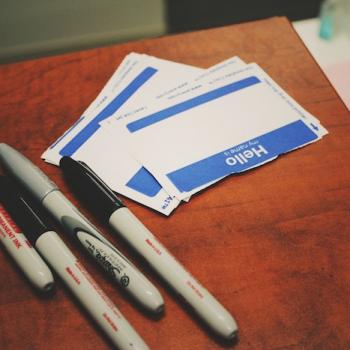For years I described myself as an anxious Christian, especially when it came to prayer. I always felt that I could never truly pray enough or do enough for God, and I carried a looming burden of guilt and fear.

In the back of my mind, the God I imagined in my prayers wasn’t a particularly caring or involved God, but when I described myself as an “Anxious Christian,” I always circled back to the apparent crisis that I could never shake the feeling that I wasn’t praying “enough.”
What is “enough” when it comes to something as important as prayer?
The more I talked with one anxious Christian after another, I found that there were actually other kinds of anxious Christians who bring very serious concerns to their attempts at prayer:
Christians Who Believe God Is a Monster
Some Christians have been taught a version of God who is monstrous and angry. This God can damn people to an eternity of torment in hell based on his own whims.
Anything that appears vindictive or unjust simply cannot be so because this God is holy.
These Christians can’t pray because they can’t trust this God. It’s hard to process whether this God is looming over them with a thunderbolt or reaching out with loving arms.
Prayer is next to impossible when you’ve been taught about this kind of God.
When Jesus says he’s a doctor who has come to heal, these Christians also imagine an angry God poised to strike.
When Paul writes about the depth of God’s love, they also consider the heights of God’s anger.
I didn’t learn quite an extreme version of God, but I still imagined God operating more like a judge than a loving parent. It was next to impossible for me to pray until I became an atheist in the sense that I rejected God as judge and made space for the God presented by Jesus.
Christians Who Treat Prayer Like Magic
For anxious Christians who learn that you can be saved by saying the sinner’s prayer sincerely, it’s understandable that we would end up treating prayer kind of like a magical spell.
This is why so many Christians pray the sinner’s prayer again and try to rededicate their lives. “This time I’m going to really mean what I pray!“
Whether this means an internal examination of our sincerity or chanting prayer in a certain way or repeating words with the hope of creating some kind of emotional or spiritual effect, pray can become more like a spell or a mechanical practice.
In this type of mindset God is removed from us, waiting for us to get the words or our emotions just right.
Teachers of contemplative prayer like Thomas Merton assure us that even the desire to pray in the first place comes from God. When entering into prayer, whether in silence, centering on a word, or using the words of others or our own words, Thomas Keating writes that we can only do prayer wrong if we get up and leave the room.
Prayer is a gift from God, an invitation to be present and to trust the Holy Spirit prays on our behalf.
Christians Who Can Never Pray Enough
This was my prayer anxiety of choice for years because I could never reach a point where I felt like I had prayed enough.
The path forward has been to adopt some of the prayer practices of the church to give my day a little bit of structure while also cultivating a more general awareness of God.
I’m not using a score card where I hit some sort of prayer goal. I’m trying to pray within a daily rhythm.
For instance, I use The Divine Hours prayer book and set aside time daily for silence. I use the daily Examen questions to remain aware of what to pray about, and I generally try to remain aware of my soul.
Is my mind spinning with ideas or worries? Am I tense or at peace?
I can never pray enough to eliminate my sense of guilt, but I can reject that mindset altogether.
I believe that Jesus came to teach us a new reality about God and prayer: God is a loving parent who is present and willing to heal us. We can set aside time to be present for God and live with a growing awareness of his transforming love.
Guilt and duty aren’t the tools Jesus uses. He calls us with love and mercy to be present for a God who transforms our lives from the inside out. No guilt or anxiety is necessary.
Read More About How to Pray…
This is an adaptation from Flee, Be Silent, Pray. After years of anxious, hard-working spirituality, I found peace with God by practicing contemplative prayer. I’ve written an introduction to this historic Christian practice titled:
Flee, Be Silent, Pray:
Ancient Prayers for Anxious Christians
Amazon | Herald Press | CBD
Photo by Naassom Azevedo on Unsplash

















